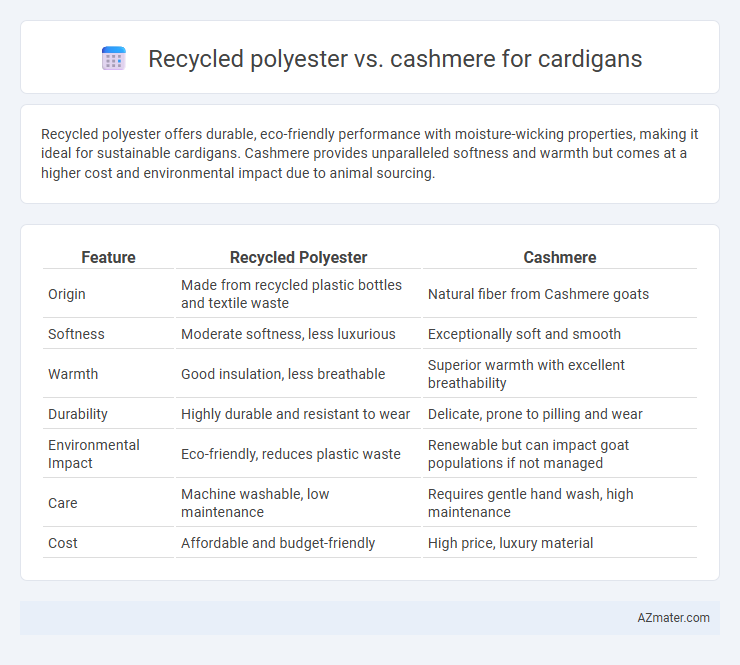Recycled polyester offers durable, eco-friendly performance with moisture-wicking properties, making it ideal for sustainable cardigans. Cashmere provides unparalleled softness and warmth but comes at a higher cost and environmental impact due to animal sourcing.
Table of Comparison
| Feature | Recycled Polyester | Cashmere |
|---|---|---|
| Origin | Made from recycled plastic bottles and textile waste | Natural fiber from Cashmere goats |
| Softness | Moderate softness, less luxurious | Exceptionally soft and smooth |
| Warmth | Good insulation, less breathable | Superior warmth with excellent breathability |
| Durability | Highly durable and resistant to wear | Delicate, prone to pilling and wear |
| Environmental Impact | Eco-friendly, reduces plastic waste | Renewable but can impact goat populations if not managed |
| Care | Machine washable, low maintenance | Requires gentle hand wash, high maintenance |
| Cost | Affordable and budget-friendly | High price, luxury material |
Introduction: The Cardigan Dilemma—Recycled Polyester vs Cashmere
Choosing between recycled polyester and cashmere for cardigans involves weighing sustainability against luxury. Recycled polyester offers eco-friendly durability derived from repurposed plastic waste, making it a practical choice for environmentally conscious consumers. Cashmere, sourced from the undercoat of Kashmir goats, delivers unmatched softness and warmth but often comes with a higher ecological and financial cost.
Material Origins: Where Recycled Polyester and Cashmere Come From
Recycled polyester is derived from post-consumer plastic waste, such as PET bottles, which are processed and remanufactured into fibers, reducing environmental impact by diverting plastics from landfills and oceans. Cashmere is sourced from the soft undercoat of cashmere goats, primarily found in regions like Mongolia, China, and Iran, known for its luxurious fiber harvested through combing during molting season. The origin of recycled polyester emphasizes sustainability through upcycling synthetic materials, whereas cashmere reflects natural fibers procured from animal heritage and traditional methods.
Sustainability Comparison: Environmental Impact of Each Fiber
Recycled polyester significantly reduces landfill waste and lowers carbon emissions by repurposing plastic bottles, making it a more sustainable option than virgin synthetic fibers. Cashmere, while biodegradable and renewable, has a higher environmental footprint due to overgrazing by goats leading to land degradation and increased methane emissions. Choosing recycled polyester for cardigans offers a more eco-friendly balance of durability and resource efficiency compared to the ecological challenges associated with cashmere production.
Comfort and Feel: Softness, Texture, and Skin Sensitivity
Recycled polyester cardigans offer durability and moisture-wicking properties but tend to feel less soft and breathable compared to cashmere, which is renowned for its luxurious softness and lightweight texture. Cashmere's natural fibers provide exceptional warmth while being gentle on sensitive skin, reducing irritation and enhancing comfort. In contrast, recycled polyester may cause slight discomfort or static cling, making cashmere the preferred option for those prioritizing softness and skin sensitivity.
Durability and Longevity: Which Cardigan Lasts Longer?
Recycled polyester cardigans offer superior durability due to their resistance to stretching, shrinking, and abrasion, making them ideal for long-term wear. Cashmere cardigans provide exceptional softness and warmth but are more delicate, prone to pilling and fiber breakage over time. When prioritizing longevity, recycled polyester cardigans generally outlast cashmere, maintaining their shape and appearance through multiple washes and extended use.
Warmth and Insulation: Performance in Cooler Weather
Recycled polyester offers excellent warmth and moisture-wicking properties, making cardigans made from this material highly effective in cooler weather due to their ability to retain heat while remaining breathable. Cashmere provides superior natural insulation with its fine fibers, delivering exceptional softness and warmth, ideal for maintaining comfort during cold conditions. While cashmere excels in luxurious warmth, recycled polyester cardigans often outperform in durability and moisture management, ensuring reliable insulation in variable climates.
Care and Maintenance: Washing, Drying, and Stain Resistance
Recycled polyester cardigans offer superior stain resistance and are machine washable, making care and maintenance straightforward with cold water washing and low-heat drying recommended to preserve fiber integrity. Cashmere cardigans require delicate hand washing or specialized dry cleaning to maintain softness and prevent shrinkage, with natural fibers more prone to staining but responsive to gentle spot treatments with mild detergent. Proper drying for cashmere involves flat drying to avoid stretching, while recycled polyester dries quickly and resists wrinkles, enhancing convenience and longevity in everyday wear.
Ethical Considerations: Animal Welfare and Recycling Initiatives
Recycled polyester cardigans prioritize environmental sustainability by reducing plastic waste and minimizing resource consumption, while cashmere involves ethical concerns surrounding animal welfare due to the intensive farming of goats. Recycling initiatives in synthetic fibers promote circular fashion, reducing landfill burden and lowering carbon footprints compared to traditional cashmere production. Consumers seeking cruelty-free options often favor recycled polyester, which supports eco-friendly textile innovation without compromising animal rights.
Price and Accessibility: Affordability for Consumers
Recycled polyester cardigans are significantly more affordable than cashmere options, making them accessible to a broader range of consumers. The manufacturing process of recycled polyester reduces raw material costs, resulting in lower retail prices. In contrast, cashmere cardigans come with a premium price tag due to the labor-intensive production and rare sourcing of cashmere fibers, limiting accessibility for budget-conscious buyers.
Final Verdict: Choosing the Best Cardigan for Your Lifestyle
Recycled polyester cardigans offer durability, moisture-wicking properties, and eco-friendly benefits that suit active lifestyles and budget-conscious shoppers. Cashmere cardigans provide exceptional softness, warmth, and luxury, making them ideal for formal occasions and colder climates. Choosing the best cardigan depends on balancing sustainability needs, comfort preferences, and intended use, with recycled polyester excelling in performance and cashmere leading in luxury.

Infographic: Recycled polyester vs Cashmere for Cardigan
 azmater.com
azmater.com